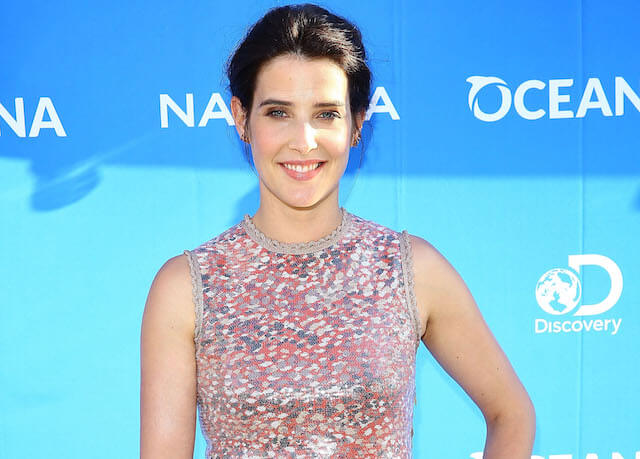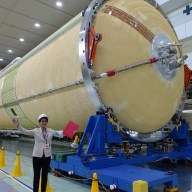Since her nine year stint on “How I Met Your Mother” ended, longtime player Cobie Smulders has divvied her time between Marvel business — she’s played S.H.I.E.L.D. biggie Maria Hill in four projects so far — and indies. Earlier this season she cussed up a storm in Andrew Bujalski’s fitness-centered “Results.” In “Unexpected” she’s only slightly less grouchy as a young teacher who accidentally gets knocked up. Her crankiness over her changing body, coupled with the anxiety over trying to keep her career going, dovetails with her friendship with a low-income student (Gail Bean) who’s also expecting. Elizabeth McGovern plays your mom here, and I’m sure everyone has said this but it’s really uncanny how alike you two look.
Kris was quite inspired by the movie “She’s Having a Baby,” in which Elizabeth McGovern plays the pregnant wife. She told me to watch it before we shot. Two weeks later Elizabeth McGovern was playing my mom. She and I have that Wonder Woman gene in us: dark hair, blue eyes and white, white skin. But it was weird. It really hit home when we were together for the first time that there’s a lot of alikeness. Listen, if I end up looking like that at her age I’ll take it. This is very frank about what pregnancy is like for women. Do you feel other films haven’t really captured that? None of them have gotten it right until now! [Laughs] I mean, even in ours it’s hard not to rely on the comedic elements of a movie dealing with pregnancy: the labor, the Lamaze breathing, the pregnancy cravings. I just don’t think we’ve seen a woman deal with the fact that she has to stop working, or feel like she’s losing her identity through pregnancy. When you’re pregnant and in a relationship, you have to ask, “What are you going to do?” or “When are you going to go back to work?” if you have a strong career. It’s different for everybody. I thought it was interesting portraying a woman who has such a strong drive to keep working, to be a part of the work force, to have a passion other than her family — to try and wrap her head around it while going through so many changes. In America, at least, there’s still a fight to get more maternal leave, or even keep it at what it is.
I hope we can get to a place in our society where every job and every work force is understanding towards having a family — that a woman has to take a break, and that a man does too. Growing up in Canada we have paternity leave, which is amazing, as well as a healthy maternity leave. In this industry I’ve been lucky. You are self-employed. I love checking that box whenever I’m filling out a government form. It’s great if people want to employ you all the time. But if you’re actively looking for work constantly, it’s less so. There’s something very freeing about being on your own schedule, but there’s also something terrifying about taking time off. You’re someone who worked well into your pregnancy then came back relatively quickly. Are films a fairly flexible industry for that? Has Marvel been good coordinating with your personal life and other jobs? They’ve always been accommodating, not so much with pregnancy, because I didn’t have to deal with that, but in terms of other projects. If something comes up they’re very happy to help me work them out so I can do both. Do you feel your long history in TV has helped you deal with indies and their long days and limited resources?
Well, no. I feel I was very spoiled with “How I Met Your Mother,” because it’s a sitcom. By the end of it we were only working a couple days a week. We were such a well-oiled machine at that point that we’d bang out 20 to 30 pages of script a day like it was nothing. I’m very good at memorizing lines now. Now in films you’re at the mercy of locations and times and all that. But it makes things interesting. How were your experiences pretending to teach?
So much of it had to be on the ground, a lot of the high school scenes. These were normal kids. Some of them wanted to be actors, some were cast through agencies. But a lot of them went to the school. They put a poster up: “If you want to come, Saturday at 6 a.m., we’re hiring!” Some of my favorite moments were pretending to be their teacher, because they were so well-behaved. I was like, “You are supposed to be super-annoying, rowdy kids. You don’t listen to me.” And every time I spoke they’d be like [makes a rapt attention face], they’d be listening to me. I know I didn’t do that. I’d be whispering or sending notes. We didn’t have text messaging but I would have been on my phone. So we had to break them out of that “there’s a camera on me” mentality. Kris Swanberg comes from a very collaborative filmmaking background. Could you sense that you were very much involved in the process?
It’s always fun when the writer is the director. In my experience they’re either like, “This is why this word is here” or “Just f—ing say whatever you want.” Kris was a combination of the two. She was very open with me, probably because I related to what Samantha was going through, being a mother myself, and being a working mom at that. I was able to have a lot of input in the script. She’d even add scenes for me. I was really adamant about — I wouldn’t say adamant. The Canadian version of being adamant is saying, “Hey, I had an idea, don’t worry about it, I know you’ve scouted everything and it will be a pain in the ass, but I had this idea where Samantha could go out and buy a pregnancy test at the local convenience story, which would be near the high school so we can showcase the neighborhood a little more, if it’s OK, if it’s not too much trouble.” That’s me being adamant.
Cobie Smulders tackles maternity leave in ‘Unexpected’

Getty Images
Follow Matt Prigge on Twitter @mattprigge


















